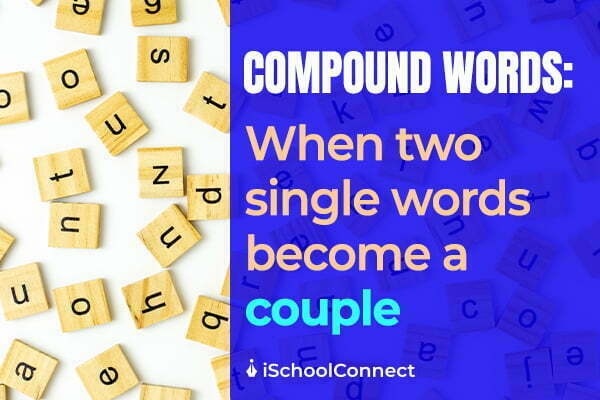Table of Contents
Many compound words exist in English. There could be many that you probably never realized were compound terms. Words like ‘football,’ for example, are made up of two different words: ‘foot’ and ‘ball.’ When combined, they form the name of a sport.
If you want to delve deep into learning about compound words, then read ahead. We have discussed it all in detail.
Compound words in various forms
Compound words are made up of two or more words that have been combined to form a new word with a distinct meaning. There are three types of compound words-
- Closed compound word
- Open compound word
- Hyphenated compound word
It is crucial to remember, though, that a compound word doesn’t have to consist of just two components. One can also make a compound with more than two terms.
Closed compound words
The most well-known of the three categories are closed compound words. These words are formed when two or more words that were earlier unrelated but are now accepted as one are combined to make a single, larger word.
Consider the following examples–
- Waistcoat
- Railroad
- Mailbox
- Sunflower
- Breakfast
Let’s have a look at the word ‘mailbox.’ ‘Mail’ and ‘box’ are the two words that make this up. In this example, the word ‘mail’ does not mean ‘to write.’ Additionally, ‘box’ is a word that is added. However, the compound ‘mailbox’ means to store mail in a box. Thus, we get an entirely new word.

Open compound words
Open compound words differ from closed compound words in a way that they still appear as two, separated by a space. A modifying adjective is used with a noun to create a new noun. We classify them as compound words since they have a new and distinct meaning when they’re combined.
Consider the following examples-
- Living room
- Real estate
- Ice cream
The word ‘room’ is a noun that is complete on its own. However, the word ‘living’ is added to it. So, it specifically becomes a new noun – living room – which means a room meant for living purposes. Another example is ‘reading room,’ which is a room meant for reading.
Hyphenated compound words
There are a lot of things to remember when it comes to hyphenated compound words. The most crucial thing to remember is that if an open compound word is used to modify another noun, it will nearly always be hyphenated.
When modifying a noun like ‘player’ or ‘collector,’ for example, the term ‘video game’ is an open compound that is usually hyphenated. As a result, the new phrases are video-game collectors.
Hyphens are often used when a compound adjective is put before a participle, or a word is framed from an action word. These terms can likewise be utilized to modify a thing’s significance. For example, in the phrase “record-breaking snow,” the adjective occurs before the present participle, and they both refer to the noun “snow.”
Consider the following examples–
- Short-term
- Father-in-law
- Cold-hearted
- Merry-go-round
- Check-out

How are compound words formed?
Like many other aspects of the English language, they are the outcome of linguistic evolution. When two words are used together often in speech and writing, their meanings become increasingly similar over time. This usually happens first in speech and then in writing, when compounds are recognized as separate words.
The closed compound word ‘notebook’ is a perfect example of this. We would have said, “a book to write notes in” before the word “notebook” existed. It’s possible that this was condensed to an open compound, ‘note book’ at that point. This would have eventually turned into the term notebook, which we still use today.
We may also compare words that should be similar in nature to see how the English language evolves through time. Backyard and backseat are closed compound words, but the front yard and front seat are open terms. Nonetheless, they both define a certain area of the yard or a car seat’s location.
However, sometimes compounds are produced as a result of a linguistic gap. For example, the term ‘football’ would have been developed out of necessity because the game would have been without a name otherwise. This compound is regarded to be quite literal, as it is made up of the terms foot and ball, which refer to the act of kicking a ball with one’s foot.
Compound words are sometimes referred to as compound nouns. When two nouns are united to make another noun, it is called compounding. A compound noun is a sort of compound word used to describe someone, somewhere, or something. Compound nouns include toothpaste, rain forest, brother-in-law, etc.

Common errors in compound words
Writers might quickly become lost by compound words. Closed compounds (for example, horseshoe), hyphenated compounds (light-year), and open compounds (income tax) are all terms used to describe compound nouns.
A broad group of words, such as everyday, are rightly closed in one grammatical form and open in the other. This is true for many verb-preposition phrases, such as “log in,” “break down,” and “mark up,” that become closed compounds when used as nouns. There are, however, exceptions, such as come-on, where the compound is hyphenated as displayed.
In a nutshell
All in all, a compound word is one that is made up of two or more terms that have been combined. The two (or more) terms that make up the compound word are separate terms with unique meanings. If you want to clear out more of your English doubts, reach out to us or drop a comment!
Liked this blog? Read more: Parts of Speech in English | An overview on 8 important sections
FAQs
Q1. What are some tricky compound words?
Answer- The following are a few tricky compound words-
- A lot- many
- Allot- to give
- All together- as a group
- Altogether- entirely
- Every day- time or period
- Everyday- noun or adjective
Q2. How to identify compound words?
Answer- When two words are used together to yield a new meaning, a compound is formed. Some change their type based on their function in a particular sentence. To identify compound words, you must know the word’s function in the sentence such as a noun, an adjective, or a verb.
Q3. What are compound sentences?
Answer- A compound sentence has at least two independent clauses joined by a comma, semicolon, or conjunction. For example, they spoke to him in French, but he responded in English.







